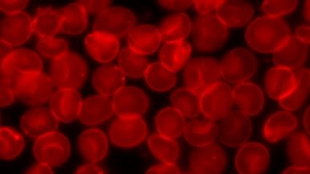 Red blood cellsWIKIMEDIA COMMONS, MDOUGM
Red blood cellsWIKIMEDIA COMMONS, MDOUGM
Researchers have discovered yet another role for long-noncoding RNAs (lncRNAs): preventing cell suicide in red blood cells. The findings, published today (December 7) in Genes and Development, suggest that lncRNAs could play a role in fueling certain types of leukemia, which often have lower levels of programmed cell death, or apoptosis.
Only 10 percent of RNA is used as a template for creating proteins; the role of the other 90 percent is a mystery scientists have only begun to crack. Some RNA molecules are known to inhibit translation, for example, and a tiny fraction of non-coding RNAs of 200 base pairs or more have previously been shown to upregulate genes.
In the current study, researchers at the Whitehead Institute in Massachusetts found one particular lncRNA ...


















